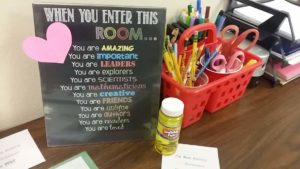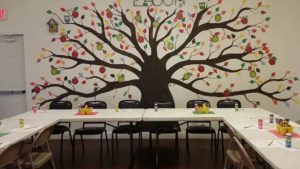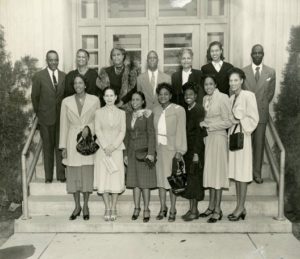Top 10 “Most Opened” Blog Posts of 2019: # 1
By Grecia Chavira
I am a DACA-mented teacher in Waco.
By that I mean I’m a beneficiary of “Deferred Action for Childhood Arrivals”, or DACA. This executive action was implemented by the Obama administration in June of 2012. DACA provides protection from deportation and work authorization for young immigrants, often referred to as DREAMers, who have completed high school and arrived in the United States before their sixteenth birthday. This benefit gives me protection, but it often feels like an undeserved privilege.
Lately I’ve felt that my “privilege” didn’t start with DACA, it started when I began my journey as an immigrant into the United States almost 20 years ago. I realize now that the start of my story as an immigrant is starkly different than most.
When I was 8 years old, I arrived in Waco on a charter bus with my family by my side. I didn’t need to cross the desert with a coyote (a human smuggler who leads immigrants across the border illegally). I was never in danger of being raped, trafficked or lost. I wasn’t separated from my parents at the border. I was safe.
I vividly remember arriving to Waco after midnight at a yellow and green gas station. I remember running off the bus and hugging my aunt, who was anxiously awaiting our arrival. During my first year in the States, various family members graciously shared their home with my family. I didn’t live in an overcrowded detention center- I didn’t endure sexual abuse from prison guards. I was safe. I was home.
These memories arise with a sense of guilt as I read recent news of immigrants traveling thousands of miles in search of a safer and better future for themselves and their children. My parents had the same goals, but we were lucky. We were fortunate enough to have family connections, resources and a church community. We were welcomed. We were not considered a burden or a punishment.
Things couldn’t be more different for the 50,000 immigrants who have been released into San Antonio from December to March after being processed and detained at the border. The influx that occurred at the end of March included about 500 hundred asylum-seeking immigrants arriving in San Antonio. Many of these had traveled from Guatemala, Honduras and El Salvador fleeing violence, in search of safety.
Thankfully, local non-profit organizations such as American Gateways and Catholic Charities came together to rally around the immigrant families. These groups coordinated hundreds of volunteers who helped the families book tickets to travel to their final destinations or to contact family members.
Recognizing the magnitude of the situation, the city of San Antonio set up a resource center in an empty store to help the local non-profits provide enough food, clothing, and medical services to the immigrant families. City staff provided children books to read while the adults sought out legal services. As an immigrant, my heart hurt for the hardships that my immigrant brothers and sisters suffered in their search for a better life, but my Texan heart beamed with pride as San Antonio stepped up to meet their needs with love and dignity.
As I discussed these events with my good friend and local immigration attorney, Anali Looper, we wondered how Waco would handle high numbers of immigrant arrivals. Would the City step in and help our local non-profits meet their needs? Would churches show love and compassion by opening up their facilities to be used as temporary housing? Would volunteers rally as they did in San Antonio? I would hope so. But hoping isn’t enough.
Living in Waco, Texas, has never felt scary to me. I remember a childhood filled with security and love. I attended Waco public schools, where teachers loved me, motivated me and led me toward success. My teachers advocated for me and broke ground with me as an undocumented Valedictorian at University High School. As a child, I attended a small Hispanic church where I was shown to appreciate my community and to love my neighbor as myself. Now I attend a large multi-cultural church that focuses on missions around the world.
As a Wacoan, I would like to see the City of Waco and the community prepare a contingency plan for treating immigrant families with the same dignity and respect that would be awarded to US Citizen families who have been displaced by floods, hurricanes or fires. I would like for my students, many immigrants or children of immigrants themselves, to learn the value of human life and the power of community. I would like my students and their families to feel safe and loved, just like I did growing up, just like I do now.
I want to have faith that my adoptive hometown would be as
welcoming and generous should we have to respond to a situation like San
Antonio. I would hope and pray for a similar response, but would it be done?
For more information about American Gateways please refer to the website: www.americangateways.org.

Grecia Chavira is a 2nd grade teacher in Waco ISD. She grew up in Waco and graduated from Baylor University. She always dreamed of being a teacher for English Language Learners. She is a part of the community advisory committee for American Gateway, a local non-profit that provides low-cost immigration legal services. She enjoys working out, practicing yoga and visiting local restaurants with her husband, Enoc.
The Act Locally Waco blog publishes posts with a connection to these aspirations for Waco. If you are interested in writing for the Act Locally Waco Blog, please email [email protected] for more information.
By Khristian Howard
If you’ve been around Waco for a while, you have probably noticed tons of service opportunities, programs, and projects – and many of these are kid-centered. Right now, the city is sprinkled with summer meal sites ranging from traditional sites like rec centers and schools to mobile meal busses. This summer, Waco ISD even premiered a food truck to serve meals to kids in low-income areas! In the hype, it is easy to see the passion that exists around feeding children. The momentum continues to grow throughout the school year, as after-school enrichment programs pop up on every side of the city. In McLennan County, there are over 14,000 children experiencing food insecurity, so being able to provide a meal for a child is integral in shaping a healthy future for this community (Map the Meal Gap, 2019). Larger organizations like the YMCA and Boys and Girls Clubs have the abundance of resources necessary to provide food for their participants; however, for smaller after-school programs, meeting this need can be more challenging.

Such is the case for NewLife Alliance, a Christian 501(c)3 organization that “fosters communities of encouragement and empowerment for people of all ages and abilities.” Nationally, NewLife Alliance represents a collection of businesses, community organizations, churches and schools. Here in Waco, in Red Oak Townhomes (located at 4510 S. Third Street in Waco), the organization functions as an after-school program that provides educational and spiritual enrichment for the children living in this community. We sat down with Jina Jones, Program Coordinator, for Red Oak Townhomes, to talk about the value that the program brings to the community and its children.
Here’s the Scoop…

“There are so many valuable pieces,” Jina shared, “from spiritual studies, to health and nutrition events, to counseling and community safety events, [and even] direct support with toiletries and goods…but I would have to say that the youth program is the most valuable piece.” Being able to reach the youth means everything to this community, and NewLife Alliance serves to meet a serious gap for parents with limited resources. “Providing help with homework, meals, spiritual studies, and character building in a safe environment for our youth is such a huge help to the families that are income challenged and may not be able to pay for the cost of after-school care otherwise,” stated Jina.
Meal and snack sponsors needed
However, the program itself is experiencing a tight limit on resources as well. The previous meal sponsor for NewLife Alliance is no longer able to extend meal services to the part of town where the Red Oak Townhomes are located. This leaves the program without a way to ensure food for the children who participate. Jina expounded on just how serious the current predicament is for the life of the program and the kids who participate:
“We never truly know the struggle of each family here on the property and whether the meal we provide will be the last meal of their day or maybe just the healthiest meal they receive. Our problem is that because we are a non-profit, we run [out] of donations and sometimes struggle to meet the needs of the families because of lack of donations. Donations mean the world to families in need of help.”
Can you help?

For this reason, we are asking you to consider making a donation of food or money to help Jina and NewLife Alliance continue to feed the children in their programs. Food options range from full, hearty meals to simple snacks, so no contribution is too small. NewLife Alliance has been serving Red Oak Townhomes in Waco for 14 years, and with your help, the program can continue to meet the needs of children and families there.
Sign Me Up!
So, if you would like to make a donation, here are a few things to keep in mind:
- This program meets three times a week on Tuesdays, Wednesdays, and Thursdays
- Each week about 20 – 25 kids participate
- The program coordinator has opted to keep all meals and snacks peanut-free due to severe allergies among the kids
To make a donation or to get more information, please reach out to Jina Jones, NewLife Alliance Program Coordinator in Red Oak Townhomes at [email protected], or Khirstian Howard, AmeriCorps VISTA at Texas Hunger Initiative at [email protected]. We truly appreciate your help and support for the community!

Khristian Howard is an Atlanta native and a recent graduate of Georgia State University where she earned a Bachelor’s Degree in Social Work. She has a passion for empowering communities through service, and seeks to connect advocacy to creativity. Currently, she is serving as the AmeriCorps VISTA for Texas Hunger Initiative Waco, where her work focuses on fostering collective impact to improve health and eating habits in East Waco. When she is not working, you may find her sharpening her culinary skills or exploring new poetic and artistic pathways.
The Act Locally Waco blog publishes posts with a connection to these aspirations for Waco. If you are interested in writing for the Act Locally Waco Blog, please email [email protected] for more information.
References:
Map the Meal Gap. (2019). Overall and child food insecurity by county in 2017. [Table] Retrieved from https://public.tableau.com/profile/feeding.america.research#!/vizhome/2017StateWorkbook-Public_15568266651950/CountyDetailDataPublic
(As I’m sure most of you probably know, one of our Prosper Waco community goals is “McLennan County residents will live healthier lifestyles and access the best available care.” With that in mind Act Locally Waco is teaming up with Better Living for Texans to bring you a monthly blog post full of tips for healthy living. For more of the posts in this series, click here: Better Living for Texans.– ALW)
By Flor De La Garza
The belief that “eating healthy and nutritious is expensive” is a common misperception. There are several ways to save money and buy healthy foods for you and your family. Today’s focus is to provide tips and tricks to save money when buying healthy groceries by 1) identifying the in-season fruits and vegetables 2) comparing unit prices, and 3) planning meals in advance.
Know Your Seasonal Produce
You may have noticed the recent influx of watermelons, cucumbers, zucchini, corn, and many more fruits and vegetables at your local grocery store. This is because there are certain fruits and vegetables that harvest in the summer, just as there are fruits and vegetables that harvest best in other seasons (spring, fall, and winter). Knowing the “in-season” produce for each season may help you save money because the in-season food items may cost less. For example, as summer reaches its peak, you may find watermelons to be at a cheaper price than in the winter season. If your favorite produce is not in season, an alternative to eating healthy and at a cheaper price is to buy canned or frozen produce without added salt or fat. Below is a Seasonal Produce guide made with information retrieved from the U.S. department of Agriculture – SNAP Ed (https://snaped.fns.usda.gov/seasonal-produce-guide) that can serve as a guide as you shop for in-season produce next time you are shopping for groceries.

The grocery store is not the only place you can save money when shopping for produce. Starting your own garden or shopping at the farmers market is a great way to obtain inexpensive, freshly picked in-season produce. The Waco Downtown Farmers Market opens every Saturday from 9 AM – 1 PM and is located at 500 Washington Ave, Waco, TX. 76701 – you can save money, enjoy the outdoors, and contribute to local small businesses all in one trip! If you are interested in starting your own garden, the McLennan County Master Gardeners can provide you with advice, direction, and answer any questions you may have. They are available to answer your gardening questions Tuesdays and Thursdays from 1:30 PM – 4:30 PM at (254) 757-5180. You may also connect with the McLennan County Master Gardeners at the farmers market as they set up a semi-monthly booth to provide outreach on a variety of gardening topics.
Remember: fresh, frozen, canned, and dried – it all counts!
Comparing Unit Prices
To decide on the “cheaper option” within food items, one common way to compare prices is to look is to look at the total price of two items and simply compare them to determine which price is the lowest. However, this tactic may not always work because of the packaging, weight distribution, or size difference of both items. A more beneficial alternative is to compare unit prices. The unit price is the cost of an item based on a specific unit, such as a pound, ounce, or quantity per container.
Knowing the unit price can allow you to compare the cost of a food item based on brand and size. For example, (see below for picture) when buying XYZ Yogurt, it may appear that the total price of the 6-ounce (oz) yogurt is the cheaper option when compared to the 32 oz yogurt. However, when comparing the unit prices, the 32 oz yogurt is .07 cents cheaper per ounce.

Planning Meals in Advance
Scenario: You go to the grocery store. You buy some spinach, zucchini, cucumber, and corn because you know these items are “healthy” and “in-season”. You get home. Now what? You look up healthy recipes and realize you need a few more items to complete the recipe. You make a trip back to the store and buy more items than you needed. Now you are back home, and you are over your groceries budget.
The scenario above is very common. You can prevent going over your budget by planning your meals and writing a grocery list before going to the grocery store. You can plan healthy meals that use “in-season” produce and follow the MyPlate food groups (vegetables, fruits, protein, grains, and dairy). Once you arrive to the grocery, you know exactly what you need to make healthy meals for yourself and your family without being distracted by food items you may not need. In return, you will save money and prepare healthy meals!
If you have not tried these tips and tricks before, I encourage you to practice them while shopping for groceries this month! Enjoy saving money and healthy foods!
Recipes
This month we have three refreshing recipes that call for in-season produce! All three recipes are bright and refreshing for kids, teens, and adults! Feel free to pair any of the recipes to your Fourth of July celebration. The recipes come from the Texas A&M AgriLife Extension’s Dinner Tonight Program (https://dinnertonight.tamu.edu) and the USDA – “What’s Cooking?” website.
Ingredients:
For Salad

- 3 large Cucumbers skin removed, chopped
- 3 cups strawberries quartered
- 1/2 cup red onion finely chopped
- 1/4 cup basil leaves chopped
- 1/2 cup Fat Free feta cheese crumbled
For Dressing
- 1/3 cup lime juice
- 1 tablespoon olive oil
- 2 tablespoons honey
Instructions:
- Wash your hands and clean your preparation area. Rinse vegetables, fruits and herbs under cool running water before chopping.
- In a large bowl, combine the cucumbers, strawberries, red onion, and basil.
- In a small bowl or jar combine lime juice, olive oil, and honey. Whisk or shake until combined.
- Pour the dressing over the cucumber mixture and toss to combine. Top with feta cheese.
Watermelon Cucumber Balsamic Salad
Ingredients:
- 4 cups watermelon cubed
- 2 cups cucumber cubed
- 1/2 cup red onion sliced
- 1/4 cup basil chopped
- 2 tablespoon olive oil
- 1/2 cup balsamic vinegar
- 2 ounces Fat Free feta cheese crumbled
Instructions:
- Mix together watermelon, cucumber, red onion and basil.
- Mix together olive oil and balsamic vinegar then pour over the watermelon mixture.
- Top with feta cheese and enjoy!
Ingredients:

- 1 cup crushed pineapple
- 1 cup yogurt, low-fat fruit (8 ounces)
- 6 fluid ounces orange juice, frozen concentrate (thawed)
Instructions:
- Mix the ingredients in a medium-size bowl. Divide into 4 paper cups.
- Freeze until slushy – about 60 minutes. Insert a wooden stick half way through the center of each fruit pop.
- Freeze until hard or at least 4 hours. Peel away the paper cup before you eat the fruit pop.
Note: You can mix ingredients and freeze in ice cube tray instead of cups, making great “ice cubes” in fruit juice. Try other fruits or juice concentrates for variety.

Flor De La Garza is currently pursuing a Master of Public Health degree at Baylor University. She is completing her summer practicum with Texas A&M AgriLife Extension Service in McLennan County and is working with the Better Living for Texans program. Flor is originally from Denton, TX. and has lived in Waco for about four years now. She especially enjoys learning how Waco’s organizations are working together in collaborations to reach the overall goal to improve the health and quality of life of McLennan County residents! In addition, she loves Cameron Park hiking trails, the local restaurants and food trucks!
The Act Locally Waco blog publishes posts with a connection to these aspirations for Waco. If you are interested in writing for the Act Locally Waco Blog, please email [email protected] for more information.
Houston…we have a party!” In honor of the 50th anniversary of the 1969 moon landing, Baylor University’s Mayborn Museum will host a 1969-theme party from 7 p.m. to 10 p.m. on July 20.
The event will include 1960s-themed hors d’oeuvres and mocktails. Guests are encouraged to dress in 1960’s-era costumes and will be treated to a performance by Austin’s premier Motown tribute band, Groove Knight. Party tickets are $35 each for adults, $25 for museum members and Baylor students and can be purchased at the front desk or online at www.MaybornMuseum.com.
During the event, both the SpaceX and Be the Astronaut exhibits will be open at the
museum with available photo ops for guests. Designed in consultation with an advisory panel of NASA experts, Be the Astronaut exhibit gives visitors a sense of real astronaut pretraining with the use of touch screen stations, artifacts and interactive simulator pods built to look like space capsules.
SpaceX: This is Rocket Science exhibit features a rocket model and thruster engine, projection video, vibrant scale representation of our solar system along with historic facts of rocket development and testing facility located in McGregor, Texas.
“We are inviting all of our interested adult patrons to slip into their Nehru jacket or maxi skirt, tuck the kids into bed, and join us for an evening to commemorate mankind’s greatest leap of the 20th century,” said Charles Walter, director of the Mayborn Museum.
The historic event occurred on July 20, 1969 when Apollo 11 astronauts Neil Armstrong and Edwin “Buzz” Aldrin famously made “one small step for man, one giant leap for mankind” by landing on the moon.
“July 20th represents one of man’s crowing achievements when Neil Armstrong became the first human to set foot on the moon,” Walter said. “We hope this party will be a fun and playful way to celebrate one of the most historic moments our country witnessed during the 20th century.”
About the Mayborn Museum – The Mayborn Museum Complex at Baylor University provides a wide spectrum of
learning opportunities to engage visitors of all ages. The exhibits and education programs encourage families to learn together and design their own museum experience. This complex features a natural science and cultural history museum focusing on Central Texas with walk-in dioramas including one of the Waco Mammoth Site. The Mayborn Museum Complex also encompasses a multi-floor science discovery center encouraging hands-on learning for all ages and the Gov. Bill & Vara Daniel Historic Village. The nine wood frame buildings that comprise the village provide a glimpse into the past, bringing to life a community in the 1890s.
The museum’s hours are: Monday-Saturday 10 am- 5 pm
Thursday 10 am-8 pm
Sunday 1 pm-5 pm
The Mayborn Museum is open all year long except for the following: New Year’s Day, Good Friday through Easter Sunday, Thanksgiving Day, Christmas Eve, Christmas Day and all Baylor University home football game dates. The museum is located at 1300 S. University Parks Drive, Waco, Texas 76706. For more information, call 254-710-1110 or visit www.MaybornMuseum.com.
Press release
“Reunited and it feels so good!! This is the theme of this year’s 16th Biennial A. J. Moore High School Reunion (July 5, 6, & 7, 2019). A lot of planning has gone into making this year’s Reunion extra-special. We will celebrate the Golden Anniversaries of the Classes of 1968 and 1969 with a flair. In addition, all alumni veterans are invited to attend a lunch sponsored by several alumni and Jeff Hunter Toyota. There is no charge for alumni veterans who are registered for the Reunion. Already, more than 45 alumni veterans have registered for the luncheon.
Prior to the Alumni Veterans Luncheon there will be a business meeting where several elected civic leaders will greet alumni. Scholarships will be awarded to AJMHs legacy high school graduates.

In addition to coming together for the usual celebrating, cordiality, congratulating, and social meeting, alumni will have an opportunity to record their memories and reflections as part of an oral history project in collaboration with Baylor Oral History Department. This will be very important as it will add to contributions from others who lived and shared the AJMHS story. The school has been closed since 1971 and there are fewer voices left to share the legacy with each passing day. AJMHS alumni want the traditions, achievements, goals, and our voices to live on in recorded recollections.
On Friday, “Denim and Diamond” night, alumni will celebrate with a parade of classes from all years past, casino games, brunch, and awards to elected alumni civic leaders. On Saturday, “All White Unity Night,” alumni will celebrate with a banquet featuring Dr. Hazel Rowe, Interim Superintendent of Waco ISD. Music and dancing follows each night’s events.
Sunday morning begins with worship service and there will be a barbeque picnic that afternoon.
All events will take place in the Brazos Room at Waco Convention. For additional information visit our website.
A. J. Moore High School Alumni Association thanks everyone who is supporting this year’s Reunion. We want to send a special note of gratitude to Amy Hunter (Jeff-Hunter Toyota), Peter Kultgen (Bird-Kultgen Ford), Magnolia Market at The Silos, Ty White (Golden Corral), Dr. Pepper/Snapple Group, Awards Specialties, M & M Mars, Melvin Lipsitz (M. Lipsitz & Co.), Hilton Hotels and Resorts – Waco, and the City of Waco.
Press release
Caritas of Waco has received a $200,000 grant to continue a case management program specifically for low-income veterans, offering guidance for veterans living at or near the poverty level through a process to help them overcome financial, emotional, educational, employment and other barriers to success. The program’s goal is to assist these veterans in moving out of poverty by becoming more self-sufficient and less reliant on emergency assistance programs.
“Caritas is very excited about continuing this program and the benefits it will bring to veterans in our area,” said Tammy Stevens, Client Services Director at Caritas. “We have had numerous success stories with our case management veterans and we look forward to serving many more,” she added.
The Caritas Veterans’ Case Management Program will serve a veteran of any era and service branch who has had an honorable discharge, who resides in the six-county service area (McLennan, Bosque, Falls, Freestone, Hill, and Limestone) and who has an annual income no greater than 200% of the federal poverty level. Caritas case management staff will offer a variety of direct and supportive services that veterans need to reach individual goals.
Veterans may contact Caritas directly in person, by phone or through referral from another service provider for information about the program. Individuals will speak with the veterans’ case manager to arrange an assessment of eligibility for participation in the program. Thereafter, the veteran will work with the case manager to carry out a needs assessment and begin work on a “plan of action” to address areas of need in the veteran’s life.
Caritas of Waco is a non-profit, 501(c)(3) organization that serves McLennan County and the surrounding area by providing individuals and families with urgent support and long-term solutions to poverty.
For interviews or more information, contact Tammy Stevens by telephone at 254-753-4593 (extension 227), by e-mail ([email protected]), or in person at 300 South 15th Street.
This program is supported by a grant from the Texas Veterans Commission Fund for Veterans’ Assistance. The Fund for Veterans’ Assistance provides grants to organizations serving veterans and their families.
By Christina Chan-Park
When the founders of the United States established the decennial census in Article 1 Section 2 of the Constitution, they wanted to use the “enumeration” to give the people rights and privileges. Historically, censuses were used for conscription or taxation purposes (remember the bible story of Mary and Joseph travelling to Bethlehem for the census?); it was a way for those in power to wield control. But the US census is used to give power to the people. Getting an accurate census count ensures shared governance.
Most people are aware that the census determines how many congresspersons each state gets in the House of Representatives, but they might be less aware that it is also used to distribute $675 billion per year in federal funds spent on schools, hospitals, roads, public works and other vital programs. Getting an accurate census count means that your community gets its fair share of resources from the taxes you have paid.
The data collected in the census is not locked up in a vault somewhere but is available to the public for free. These data are accessible to companies, developers, local governments, and even individuals. They can inform decisions on where to establish new businesses or how to revitalize old neighborhoods. They can be used to prepare plans for public safety and emergencies. Getting an accurate census account provides tools and information for local community development.
The census bureau collects more information that just how many people there are and where they live. On the census they also ask about the sex, age and race of each person. For months before the April 1 census date, the census bureau and local communities work on educating the public about why they needed to be counted and ensuring them that there are only positive and no negative consequences to being counted. Getting an accurate census count ensures everyone is counted once and only once.
Go explore census.gov (where I cribbed a lot of my information). There you can find more on how census data are gathered and used; what data is gathered in between the decennial censuses; and even download data and learn about your community. Just remember: getting an accurate census count is important.

Christina Chan-Park serves as the President of the League of Women Voters Waco. To join or learn more about LWV Waco, follow us on Facebook at https://www.facebook.com/LWVWaco/ or email us at [email protected].
By Glenn Robinson
Healthcare is changing rapidly with the constant development of new technology. While these developments allow us to better diagnose and treat patients, connect with the community, and promote wellness, it is important to remember that nothing can replace the trust and communication between a patient and their doctor when it comes to your health.
This month, we explore three new developments in healthcare technology and how they may affect your future care.
Prescription Kiosks
You’ve long been able to get food, drinks, money, and even DVDs out of machine kiosks. Now, there is something else Waco residents can get from similarly designed machines – their prescription medications.
In April, Baylor Scott & White Health installed the first remote prescription kiosk of its kind in Texas on the campus of the Texas Farm Bureau Headquarters in Waco, with more kiosks to be installed throughout the region in the coming months.
The pharmacy kiosks are being introduced at various locations to make filling prescriptions easier for more patients. Making managing your health easier and more convenient is one of the primary focuses of the nation’s leading healthcare providers, as well as federal and state regulatory agencies.
In fact, the kiosks themselves are as much a regulatory breakthrough as a technological one. After a year of evaluation, the Texas State Board of Pharmacy approved new rules that took effect in June of last year allowing Texas pharmacies to deliver medications outside of retail pharmacy locations via a kiosk. These kiosks must maintain the security of the medication and the efficacy of the medication during its storage.
While different kiosks may have different features, Baylor Scott & White kiosks fill all prescriptions and make prescriptions available within hours of pharmacy receipt. They can be picked up 24-hours a day, and pharmacist consultations are available via phone or video.
As they grow in number, kiosks will hopefully help make sticking to a medication plan easier to swallow.
Trackable Pill
Privacy concerns over technology are not just limited to social media and smart phones. A recent poll found that doctors are evenly divided over the cost and ethical implications of smart pills – an innovative technology which embeds sensors into medication to allow healthcare providers to monitor when it is taken.
The so-called smart pill contains a sensor about the size of a grain of sand that detects, records, and transmits the date and time a pill is ingested to a patch worn by the patient. The patch then relays the data via a smart phone application to doctors, family members, or other caregivers.
The greatest potential benefit of smart pills is that patients may be more likely to take their medicine if they know it is being tracked. Experts estimate that medication noncompliance costs $100 billion a year – much of it due to patients getting sicker and needing additional treatment or hospitalization because they didn’t take their medicine appropriately.
In fact, according to some estimates, patients not taking their medications as prescribed leads to about 10% of hospitalizations and 125,000 preventable deaths in the U.S. each year.
On the other hand, smart pills have the potential to lead to false-negative readings and can stir anxiety among patients about having their behavior tracked. There also is no evidence thus far that this technology will help patients take their medication as prescribed.
Regardless, with the Food and Drug Administration approving the first smart pill in late 2017, this technology’s potential is something worth tracking.
Clinical Wearables
One smart device maker recently issued an odd warning – its new smart watch technology to detect atrial fibrillation is not intended for people who have atrial fibrillation.
The truth is that a gadget worn on the wrist is simply not accurate enough to assess serious medical conditions. It’s mostly a vehicle for conversations with your doctor.
Stanford researchers working with the smartwatch maker to detect atrial fibrillation probably won’t cause an epidemic of worrisome diagnoses, but it didn’t really answer most of the questions doctors or consumers have about using the watch as intended.
With that in mind, the smartwatch company is now teaming with a large healthcare company to a conduct a study of 180,000 people over the age of 65 to get a better understanding of its own device’s impact on health.
As wearable smart technology makers push more deeply into healthcare, their creations are crossing the line into becoming medical devices. Although they may fit the definition of medical devices, the Food and Drug Administration has expressed little interest in regulating low-risk fitness monitors that are promoted for general “wellness.”
In practice, this means that companies can make exaggerated claims about the effectiveness of their devices for promoting wellness while doctors are puzzled about how to effectively use the sometimes-unreliable data the devices provide.
So, for the time being, patients’ best bet is trusting their instincts and their medical providers – not their smart watches – for diagnosing potential serious health events.

Glenn Robinson is the President of Baylor Scott & White Medical Center – Hillcrest. He has over 30 years experience in hospital and health care management, and currently serves on several Boards associated with the Texas Hospital Association and the American Hospital Association. In addition, Glenn is Past-Chair and an active member of the Greater Waco Chamber of Commerce, and serves on the Prosper Waco Board.
The Act Locally Waco blog publishes posts with a connection to these aspirations for Waco. If you are interested in writing for the Act Locally Waco Blog, please email [email protected] for more information.
(This post is part of a series of posts about CASA – Court Appointed Special Advocates. – ABT)
By Jennifer Whitlark
Welcome to our 4th and final blog post in our CASA series.
Today, we have some Q&A with advocate Jennifer Whitlark, a working professional who makes time to contribute to her community even amidst her busy schedule.
How did you initially become interested in CASA?
I heard about CASA around town for several years before I got involved. I knew it was a great organization and I waited until I had some more space in my work life in order to join the organization.
What made you decide to get involved?
I work as a school administrator in Waco but I deal mainly with academics in my work and I was really interested in being more involved with the family side of things with the students. Being a CASA allowed me to experience this piece in a new way. Also, given the population I work with in my job, I knew the needs of children in hard situations and this gave me an avenue to work with them and try and make a difference. I also just feel called to love children and care for them.
Can you tell us a bit about your experience with CASA training and how it prepared you for your advocacy?
The training was a great time to learn the law as well as the good and hard points of being a CASA. It was helpful to hear stories of others’ experiences and also hear about all of the supports in place for advocates.
How does your CASA Supervisor support you in your advocacy? Has that coaching relationship been valuable to you?
My CASA supervisor has been a great sounding board for me. He has answered my questions, given my advice, and encouraged me. It has been a very beneficial relationship and his help has been invaluable.
How do you balance CASA and working full time?
I have to work to intentionally balance CASA responsibilities with my job. I have to carve out time to see my CASA child, write reports, and make phone calls. There are seasons when this is harder than others but it has been fine once I found ways to make this happen.
What is a highlight from your CASA advocacy so far when you felt like you made an impact?
At the beginning of my first case, the mom was very standoffish. She didn’t know me and didn’t trust me. She was shy, self-conscious, and defensive. I had to work to slowly break down the wall she had built around herself. Fast forward to 1.5 years later she was truly a different person. At her last court hearing her case was finally dismissed and she got her kids back. The whole courtroom clapped and cheered and she cried. She gave me a big hug and we celebrated. I drove her home from court that day and she told me how much she had grown and how much she had learned. She said she never wished this upon anyone but she explained how much more confident she felt as a mom and how this process has helped her in life. It was such a great conversation and as I reflected on how much she had truly grown from when I met her it was a confirmation that CASAs can make a difference in lives.
To learn more about CASA of McLennan County and the need for more advocates, visit our website at www.casaforeverychild.org or find us on social media @casamclennan.
If you have questions or are ready to begin advocating for children in foster care, email our CASA Recruiter, Kate Gilbert, at [email protected].

Jennifer has called Waco home for 20 years. She is originally from California but came to Waco to attend Baylor and never left. She has worked at Rapoport Academy since 2003, first as a 4th grade teacher for six years, then she stepped into administration as the Dean of Academics over the Elementary Campuses. Her husband, Jason, teaches at Baylor University and they have a 12-year-old daughter, Hannah. In her free time, when she’s not working or advocating for her CASA kids, Jennifer likes to read and work on cross stitching.
The Act Locally Waco blog publishes posts with a connection to these aspirations for Waco. If you are interested in writing for the Act Locally Waco Blog, please email [email protected] for more information.
By Kristi Pereira
I love collaborating. I love being in a room of colleagues and fellow community members, discussing projects and plans, and exploring ways in which we can work together to achieve a common goal. And I especially love this if that common goal is something that has the potential to create an improved quality of life in our beloved Waco. There is very little that is as satisfying to me professionally as when individuals come together to create something meaningful that benefits our community as a whole.
I have had the privilege of working for and with several non-profits within our community, and I now serve as the Coordinator of Community Programs in McLennan Community College’s Continuing Education Department. Over the past several years, I have enjoyed a great deal of partnering, networking, and you guessed it….collaborating. The projects and plans that I have witnessed come together the most successfully can be attributed to each person’s commitment to diligently working together in order to see the task through to the end. I am incredibly grateful to work in a position where I get to witness this very thing on nearly a daily basis. Our Continuing Education mission statement specifically states that we are “deeply committed to the advancement and enrichment of Waco and McLennan County through our collaborations to offer the best learning experiences possible.” We accomplish this in a number of ways, and like links in a chain, we cannot optimally function without every piece coming together.
It starts with our students. Our community has supported our mission to provide lifelong learning for more than 50 years! This long-term dedication has allowed our programs to grow and flourish, all while bringing people together from all walks of life to learn new skills and hobbies. From the children who attend Kids College, to the adults who prioritize lifelong learning, we would not exist without each student’s desire to expand their knowledge through our courses.
Furthermore, we would not function without our incredible team of instructors. Our instructors plan, prepare, and execute courses that meet a wide variety of needs within our community. They come to us excited to share their knowledge and experiences, and we are grateful for their influence. Even during my short time at MCC, I have heard stories of individuals gaining skills that helped them land their dream job, or others turning what was initially a hobby into a thriving career.
Another important link in the collaboration chain are our community partners. In recent years we have established partnerships with a number of local businesses and organization who have helped us expand and promote our course offerings. These partners have opened the doors of their businesses to help us reach an even broader audience, as well as provide new and unique learning opportunities to members of the Waco community.
I am proud to work for an institution that encourages partnership, and also to live in a city that embraces interconnection. We like to say in the Continuing Education Department that “Life is Good in Waco” (we print this very phrase on all of our publications!) And it is true! And life will continue to be good in Waco every time we choose to link together, creating an unbreakable chain of community collaboration.
Here’s the link to see what MCC Continuing Education has to offer: http://www.mclennan.edu/continuing-education/

Kristi Pereira is the Coordinator of Community Programs at McLennan Community College, through the Continuing Education Department. Originally from the Pineywoods of East Texas, she has called Waco home for almost 12 years. Kristi enjoys all things fitness and nutrition, reading, volunteering, and a good cup of coffee. She has been married to her husband Hermann, for almost 15 years, and they have two kids, Hudson and Ruby.
The Act Locally Waco blog publishes posts with a connection to these aspirations for Waco. If you are interested in writing for the Act Locally Waco Blog, please email [email protected] for more information.
